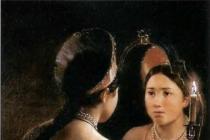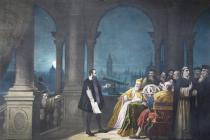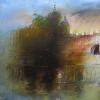Composition
The name of Vasily Andreevich Zhukovsky, friend and teacher of the AS. Pushkin, entered Russian literature as the author of a number of ballads. He resurrected in ballads the images of the feudal Middle Ages and folk legends full of naive faith. For the first time, the definition of ballad as a genre was given by V.G. Belinsky He defined its originality as follows: “In a ballad, the poet takes some fantastic and popular legend or invents an event of this kind himself, but the main thing in it is not the event, but the sensation that it excites, the thought to which it leads the reader. »Most of Zhukovsky's ballads are translated. The poet himself wrote about the specifics of the talent of the poet-translator: "Translator: in prose there is a slave, in poetry there is a rival."
Zhukovsky's first ballad was "Lyudmila" (1808), which is a free translation of the ballad "Lenora" by the German poet Burger. Using the plot of the German poet, Zhukovsky gave a different national flavor, transferring the action to Muscovite Russia of the 16th-17th centuries, gave the heroine the Russian name Lyudmila, introduced song turns and folklore features inherent in the Russian people.
The next ballad "Svetlana", written in 1812, is also based on the plot of Bürgerova's "Lenora". But in "Svetlana" the national flavor has already been strengthened, which is created by the details of everyday life and pictures of Russian nature. Therefore, "Svetlana" was perceived by the readers as a truly folk, Russian work. It was built on a broad and stable folk basis: here and fortune-telling, omens, ritual songs, and folk legends about the evil dead, and the motives of Russian folk tales.
The plot of the ballad "Svetlana" reminds in many ways the plot of "Lyudmila". Sad Svetlana wonders on Epiphany evening at the mirror about her sweetheart. She is sad about her fiance, about whom there has been no news for a long time:
The year has passed - there is no news:
He doesn't write to me
Oh! and they only have a red light,
Only the heart breathes them ...
Svetlana looks in the mirror and hears the voice of her beloved, who calls her to get married in church. On the way to the church, she sees in the darkness a black coffin in the open door. Finally the sleigh arrives at the hut. The horses and the groom disappear. The heroine, crossing herself, enters the house and sees the coffin. A dead man rises from it and reaches out to her. But Svetlana is saved by a wonderful dove, which covers her from a terrible ghost:
Shook me up, unrolled
He's light krills;
I flew to the dead man's chest ...
All devoid of strength
Groaned, creaked
He's scary with his teeth
And shone on the maiden
With menacing eyes ...
In this terrible ghost, Svetlana recognizes her sweetheart and wakes up. It turned out to be a terrible, terrible dream. At the end of the ballad, a living groom appears. The heroes unite and play a wedding. Everything ends well. The optimistic sound of the ballad is at odds with the ending of Ludmila, in which the deceased groom carries the bride into the kingdom of shadows. Fantastic events - the appearance of the dead groom on the way to his "abode", the revival of the dead - reflect the struggle between good and evil. At the same time, good wins:
Our best friend in this life
Faith in Providence.
The law of the builder is good:
Here misery is a false dream;
Happiness is awakening.
The image of Svetlana is contrasted by Zhukovsky with both Lenore Burger and Lyudmila. Sad Svetlana, in contrast to the desperate Lyudmila, does not grumble at fate, does not call the Creator to court, does not pray for the "angel-comforter" to appease her sorrow. Therefore, dark forces have no power to destroy her pure soul. Relentless fate gives way to good Providence. The ballad logic is destroyed, the happy, fairy-tale ending refutes the traditional scheme. The heroine's bright soul turns out to be stronger than the darkness of the night, faith and love are rewarded. The author's attitude to what happened to Svetlana is expressed in the words:
O! do not know these bad dreams
You are my Svetlana ...
Be, creator, her cover!
Svetlana in Zhukovsky's ballad amazes us with the purity of her inner world. Purity, meekness, obedience to Providence, loyalty, piety - these are the distinctive features of this character. The very name of the heroine sets in the poem the theme of light, opposing the ballad darkness and conquering it. To depict his heroine, the poet used folk colors,
Svetlana is one of the most important poetic images for Zhukovsky, linking together his fate and work. The name of Svetlana became for Zhukovsky and his friends a symbolic designation of a special world outlook and attitude, a "light" faith, designed to illuminate with its presence the dark essence of life. It turned out to be a kind of talisman that protects against evil forces. The image of Svetlana inspired the famous Russian artist K. Bryullov to create the painting "The Divination of Svetlana". Pushkin repeatedly recalled "Svetlana", took epigraphs from her poems, compared his Tatyana with the heroine of the ballad.
High poetic skill, romantic national flavor of the ballad attracted the interest of readers to it, and it was recognized by contemporaries as the best work of Zhukovsky, who began to be called the singer of Svetlana. Analysis of Zhukovsky's literary heritage shows the high artistic value of his poetry and makes it possible to understand how great the significance of this poet for Russian poetry and literature. The words of A.S. Pushkin, who said about Zhukovsky almost two hundred years ago:
His poems are captivating sweetness
The envious distance will take centuries ...
"Svetlana" is the most famous work of Zhukovsky, it is a translation-transcription of the ballad "Leonora" by the German poet Burger. The plot of "Svetlana" is based on the traditional old motif of folk historical and lyrical songs: a girl is waiting for a groom from the war. Events unfold in such a way that happiness depends on the heroine herself. Zhukovsky uses a typical situation of a "terrible" ballad: Svetlana rushes along a fantastic road into the world of dark forces. The plot of the work "breaks out" from reality (the girls' fortune-telling on the "Epiphany evening") into the realm of the miraculous, where the evil spirits do their dark deeds. The road to the forest, to the power of the night, is the road from life to death. However, Svetlana does not die, and her fiancé does not die, but returns after a long separation. The ballad has a happy ending: a wedding feast awaits the heroes. This ending is reminiscent of a Russian folk tale.
The main character in the ballad is endowed with the best features of the national character - loyalty, sensitivity, meekness, simplicity. In Svetlana, external beauty is combined with internal. The girl is "sweet", "beautiful". She is young, open to love, but not frivolous. For a whole year, without receiving news from the groom, the heroine is waiting for him. She is capable of a deep feeling:
The year has passed - there is no news;
He does not write to me;
Oh! and they only have a red light,
Only the heart breathes them ...
The girl is sad and yearning in separation from her beloved. She is emotional, pure, spontaneous and sincere:
How can my girlfriends sing?
Dear friend far away ...
The world of folk culture influenced Svetlana's spiritual development. It is no coincidence that the author began the ballad with a description of Russian rituals and customs associated with the church feast of Epiphany, with a wedding in God's temple. This is how the poet explains the folk origins of Svetlana's feelings: hope and duty in the heroine's heart turn out to be stronger than doubts.
The girl's folk performances are combined with religious ones, with deep faith in God and in fate. The name of the main character is formed about the word "light" and is associated with the expression "God's light", which penetrated her pure soul. Svetlana hopes for God's help and constantly turns to God for spiritual support:
Soothe my sorrow
Comforter angel.
In the most tense moment, having seen a coffin in a hut in a dream, Svetlana finds the strength to do the most important thing:
She fell to dust before the icon.
I prayed to the Savior;
And, with his cross in his hand,
Under the saints in the corner
She hid timidly.
As a reward for true faith, for meekness and patience, God saves the girl. Svetlana does not die in separation from her beloved, but finds happiness on earth. Zhukovsky believed that even the death of the groom could not destroy love. The poet was convinced that loving souls unite outside of earthly existence. His heroine also possesses the same faith. She does not murmur against Providence, but timidly asks:
The secret darkness of the days to come
What do you promise my soul
Joy or torpor?
A kind of fabulous "double" of the heroine - "snow-white dove". This is the very "angel-comforter" to whom Svetlana turned before the fortune-telling and begged: "Soothe my sorrow." This is the kind messenger of heaven, "with bright eyes." The epithet gives an idea of the purity, holiness of the angel. He keeps Svetlana. Saves her from the dead:
Breezing quietly, flew in,
He quietly sat down on her persie,
He embraced them with his wings.
"Dove" is an affectionate, gentle name. It is a symbol of love. Love saves Svetlana, and the author speaks of the dove with growing tenderness: "but the white dove does not sleep." Good confronts evil and conquers it:
Shook me up, unrolled
He has light wings;
I flew to the dead man's chest ...
The image of Svetlana's groom also corresponds to romantic ideas. He is handsome, daring, kind. The girl's beloved is capable of an all-consuming feeling:
... he is still the same
In the experience of separation;
The same love is in his eyes
Those are pleasant to the eyes;
Those on sweet lips
Lovely conversations.
The repetition in these lines emphasizes the main qualities that the author values in his characters - faith and loyalty.
In the ballad "Svetlana" good triumphs, folk-religious principles triumph. Zhukovsky revealed in his work the character of a Russian girl, open and heartfelt, pure, joyful in life. Svetlana is worthy of happiness, because in her "the soul is like a clear day ..."
The heroine has become one of the most beloved characters in Russian literature. Like Liza from the story of N.M. Karamzin, like Tatiana Larina from the novel by A.S. Pushkin.
He is one of the first Russian poets to create clear, simple and easy-to-read works. Before that, writers worked according to the principle that the harder the better. It is not easy for us to assess the scale of Vasily Andreyevich's genius, because what seems quite acceptable and common to us was amazing for the poet's contemporaries. In the 19th century, everyone was fond of sentimentalism, and Zhukovsky was no exception, so his work is a combination of this genre and folk.
An attempt to create a Russian folk ballad
Analysis of Zhukovsky's ballad "Svetlana" shows that the author took the work of the German poet Burger as the basis of the plot. Vasily Andreevich always believed that Russians should learn from their Western colleagues, but redo their work in accordance with folk customs and taking into account the peculiarities of the genre, the writer turned to the world of fairy tales, legends, fantasy and mysticism.
It should be noted that Zhukovsky's ballad "Svetlana" is completely different from other similar works. The content first catches up with the reader fear and horror from what is happening, but now the end is joyful and happy. The main characters remain alive, their fate is developing remarkably, while in such famous ballads as "Lyudmila", "Forest Tsar", one can feel the drama.
Subject analysis of Zhukovsky's ballad "Svetlana"

The work begins with an embellished painting by the author of girls' fortune-telling on Christmastide. Vasily Andreevich, in order to make the image of Svetlana brighter, turned to sentimental poetry. The reader sees the girl as modest, silent, sad. She grieves because she is separated from her sweetheart, but she does not complain about her fate, but finds comfort in her prayers. In the image of this girl, Zhukovsky wanted to embody the typical features inherent in the Russian people: religiosity, obedience to fate, meekness.
Analysis of Zhukovsky's ballad "Svetlana" shows that the author has included in his work features of romanticism and sentimentalism. First, the girl sits in front of the mirror, wanting to see her betrothed there, then falls asleep. In a dream, she meets her fiancé, follows him, but the man seems somehow unusual. Only over time, the reader, together with Svetlana, realizes that this is a dead groom. When a girl finds herself in a hut near the coffin, with her prayer she drives away otherworldly forces, a white dove that has flown onto her chest is a symbol of the Spirit of the Lord. Humility and obedience will bring salvation and reward - this is the main theme of Zhukovsky's ballad "Svetlana".
An optimistic end

The work is written in a romantic and sentimental style. Romance can be attributed to a mystical dream, in which there is an image of a terrible dead groom, an ominous caw of a crow, night horse races, deathly light of the moon, a coffin in a hut, a lonely church. Sentimentalism includes the image of Svetlana's girlfriends, fortune-telling, weddings. To emphasize this style, the poet uses diminutive nouns. Analysis of Zhukovsky's ballad "Svetlana" shows that this work is optimistic. Whatever happens in a dream, everything will be fine in real life.
Nowhere is the originality of V. A. Zhukovsky's creative personality more evident than in ballads. It was his ballads that contributed to the exceptional popularity of this genre in Russia.
Based on the plot of the ballad of the German poet Burger "Lenora", Zhukovsky created two original works - the ballads "Lyudmila" and "Svetlana".
Not finding in Russian folklore a plot about a dead groom (such a plot entered Russia relatively late), the poet found such peculiar phenomena as Russian ritual poetry and Christmas divination, during which, according to popular beliefs, her future groom appears to the bride. Putting the plot scheme of Lenora as the basis for Svetlana, Zhukovsky significantly changed it, bringing it as close as possible to Russian folklore.
The ballad "Svetlana" begins with a description of Russian folk fortune-telling. The Russian atmosphere is also emphasized here by such realities as the house, the sled, the church, the priest. The introduction itself contributes to the transfer of the national flavor:
Once in the Epiphany evening
The girls wondered:
Slipper behind the gate,
Taking them off their feet, they threw ...
The author, being a great connoisseur of Russian folklore, imitates in a ballad folk songs that girls sang during Christmas divination on a saucer: "Blacksmith, // Get me gold and a new crown, // Get me a golden ring." Throughout the ballad Zhukovsky uses folk vernacular words and expressions, such as “utter a word”, “legohonko”, as well as phrases from folk songs (“girlfriend”, “the light is red”, “my beauty”).
Against this background, the appearance of a sweet, simple-minded and morally pure Svetlana looms. She is depicted either tacitly, sad, yearning for the unknown disappeared groom, or timidly timid, freezing from fear during fortune-telling, then perplexedly alarmed, not knowing what awaits her: joy or grief. The image of Svetlana is considered the first artistically convincing image of a Russian girl in Russian literature.
The saturation of the ballad with elements of Russian folklore is an important, but not the only feature of Zhukovsky's ballad work.With a pronounced realistic introduction, national-Russian flavor and everyday realities, the defining pathos of the ballad is, of course, romantic. It manifests itself in the uniqueness of the event, in the rare charm of a rare heroine, in a conventional landscape that emphasizes the uniqueness of what is happening in time and space: "The moon shines dimly // In the gloom of fog"; "Everything around is empty", "Around a blizzard and a blizzard." Here you can see all the traditional signs of romanticism, right down to the peculiarities of the language. There is a "black lie", and a "black coffin", and "the secret darkness of the days to come."
Late in the evening, the heroine of the ballad Svetlana, sitting in front of the mirror, dreams of a distant betrothed and quietly falls asleep. In a dream, she has to go through several terrible moments. She sees a coffin, and in it - her fiancé. The falling asleep girl, worried about the fate of the "dear friend", peers into the mirror, and before her eyes both a robber den and a "replacement" groom, who turns out to be a murderer, pass by.
However, when Svetlana wakes up in the morning, she sees a sunny frosty landscape outside the window, hears a ringing bell, notices that a sleigh is entering the courtyard, and Svetlana’s fiance is not dead, but alive, who rises onto the porch. So, everything dark and fantastic in the ballad is attributed by the author to the realm of sleep, and the plot gets a happy ending.
Zhukovsky substituted hoax for the real in the ballad and gave everything an impression of fantasticality. The heroine's terrible dream is not a poetic joke or a parody of romantic horrors. The poet reminds the reader that life on earth is fleeting. Here Zhukovsky expresses the idea of the predetermination of human destiny, which is close to him. In Svetlana, to a lesser extent than in Lyudmila, the idea of the folly and even sinfulness of a man's murmur about his fate arises, for any sorrows and trials have been sent down to him from above. The poet formulates the main idea of the ballad as follows: “Our best friend in this life // Faith in Providence”.
And yet "Svetlana" is the brightest balada of Zhukovsky. Despite the fact that the author appears here as a romantic poet, moving away from the reality of life into the world of dreams and fantasy, he affirms the triumph of love over death, and the pathos of the work itself is generally joyful and optimistic.
In Zhukovsky's ballads, a poetic and deeply dramatic world of folk legends, beliefs and legends was first revealed to the reader. Like his Western European brothers in the pen, the Russian poet, in turn, discovered layers of Russian folk fiction untouched by literature. Zhukovsky called them the general term "superstition". He highly appreciated Russian folk fiction, rightly considering it a real treasure of plots and ideas. It was precisely "superstition" that was the basis for the creation of the Russian national ballad.
Nowhere is the originality of V. A. Zhukovsky's creative personality more evident than in ballads. It was his ballads that contributed to the exceptional popularity of this genre in Russia.
Based on the plot of the ballad of the German poet Burger "Lenora", Zhukovsky created two original works - the ballads "Lyudmila" and "Svetlana".
Not finding in Russian folklore a plot about a dead groom (such a plot entered Russia relatively late), the poet found such peculiar phenomena as Russian ritual poetry and Christmas divination, during which, according to popular beliefs, her future groom appears to the bride. Putting the plot scheme of Lenora as the basis for Svetlana, Zhukovsky significantly changed it, bringing it as close as possible to Russian folklore.
The ballad "Svetlana" begins with a description of Russian folk fortune-telling. The Russian atmosphere is also emphasized here by such realities as the house, the sled, the church, the priest. The introduction itself contributes to the transfer of the national flavor:
Once in the Epiphany evening
The girls wondered:
Slipper behind the gate,
Taking them off their feet, they threw ...
The author, being a great connoisseur of Russian folklore, imitates in a ballad folk songs that girls sang during Christmas divination on a saucer: "Blacksmith, // Get me gold and a new crown, // Get me a golden ring." Throughout the ballad Zhukovsky uses folk vernacular words and expressions, such as “utter a word”, “legohonko”, as well as phrases from folk songs (“girlfriend”, “the light is red”, “my beauty”).
Against this background, the appearance of a sweet, simple-minded and morally pure Svetlana looms. She is depicted either tacitly, sad, yearning for the unknown disappeared groom, or timidly timid, freezing from fear during fortune-telling, then perplexedly alarmed, not knowing what awaits her: joy or grief. The image of Svetlana is considered the first artistically convincing image of a Russian girl in Russian literature.
The saturation of the ballad with elements of Russian folklore is an important, but not the only feature of Zhukovsky's ballad work.With a pronounced realistic introduction, national-Russian flavor and everyday realities, the defining pathos of the ballad is, of course, romantic. It manifests itself in the uniqueness of the event, in the rare charm of a rare heroine, in a conventional landscape that emphasizes the uniqueness of what is happening in time and space: "The moon shines dimly // In the gloom of fog"; "Everything around is empty", "Around a blizzard and a blizzard." Here you can see all the traditional signs of romanticism, right down to the peculiarities of the language. There is a "black lie", and a "black coffin", and "the secret darkness of the days to come."
Late in the evening, the heroine of the ballad Svetlana, sitting in front of the mirror, dreams of a distant betrothed and quietly falls asleep. In a dream, she has to go through several terrible moments. She sees a coffin, and in it - her fiancé. The falling asleep girl, worried about the fate of the "dear friend", peers into the mirror, and before her eyes both a robber den and a "replacement" groom, who turns out to be a murderer, pass by.
However, when Svetlana wakes up in the morning, she sees a sunny frosty landscape outside the window, hears a ringing bell, notices that a sleigh is entering the courtyard, and Svetlana’s fiance is not dead, but alive, who rises onto the porch. So, everything dark and fantastic in the ballad is attributed by the author to the realm of sleep, and the plot gets a happy ending.
Zhukovsky substituted hoax for the real in the ballad and gave everything an impression of fantasticality. The heroine's terrible dream is not a poetic joke or a parody of romantic horrors. The poet reminds the reader that life on earth is fleeting. Here Zhukovsky expresses the idea of the predetermination of human destiny, which is close to him. In Svetlana, to a lesser extent than in Lyudmila, the idea of the folly and even sinfulness of a man's murmur about his fate arises, for any sorrows and trials have been sent down to him from above. The poet formulates the main idea of the ballad as follows: “Our best friend in this life // Faith in Providence”.
And yet "Svetlana" is the brightest balada of Zhukovsky. Despite the fact that the author appears here as a romantic poet, moving away from the reality of life into the world of dreams and fantasy, he affirms the triumph of love over death, and the pathos of the work itself is generally joyful and optimistic.
In Zhukovsky's ballads, a poetic and deeply dramatic world of folk legends, beliefs and legends was first revealed to the reader. Like his Western European brothers in the pen, the Russian poet, in turn, discovered layers of Russian folk fiction untouched by literature. Zhukovsky called them the general term "superstition". He highly appreciated Russian folk fiction, rightly considering it a real treasure of plots and ideas. It was precisely "superstition" that was the basis for the creation of the Russian national ballad.














